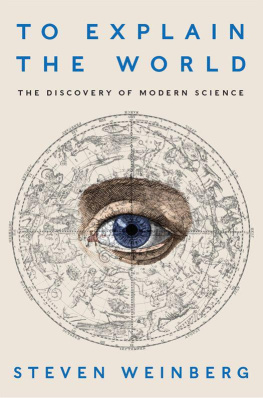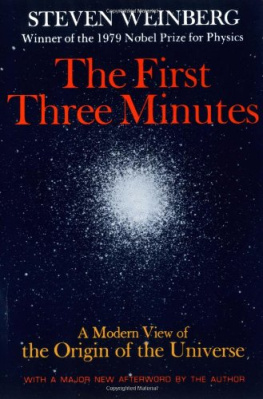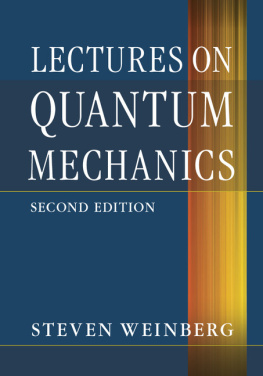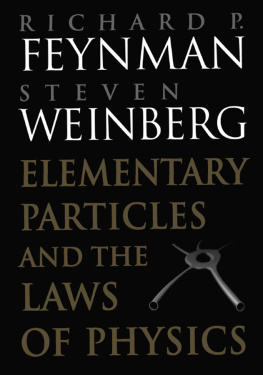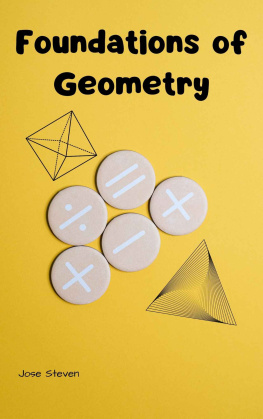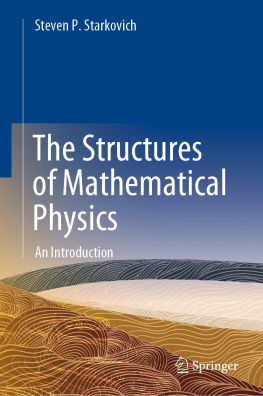Steven Weinberg - Foundations of Modern Physics
Here you can read online Steven Weinberg - Foundations of Modern Physics full text of the book (entire story) in english for free. Download pdf and epub, get meaning, cover and reviews about this ebook. year: 2021, genre: Children. Description of the work, (preface) as well as reviews are available. Best literature library LitArk.com created for fans of good reading and offers a wide selection of genres:
Romance novel
Science fiction
Adventure
Detective
Science
History
Home and family
Prose
Art
Politics
Computer
Non-fiction
Religion
Business
Children
Humor
Choose a favorite category and find really read worthwhile books. Enjoy immersion in the world of imagination, feel the emotions of the characters or learn something new for yourself, make an fascinating discovery.

- Book:Foundations of Modern Physics
- Author:
- Genre:
- Year:2021
- Rating:5 / 5
- Favourites:Add to favourites
- Your mark:
- 100
- 1
- 2
- 3
- 4
- 5
Foundations of Modern Physics: summary, description and annotation
We offer to read an annotation, description, summary or preface (depends on what the author of the book "Foundations of Modern Physics" wrote himself). If you haven't found the necessary information about the book — write in the comments, we will try to find it.
Foundations of Modern Physics — read online for free the complete book (whole text) full work
Below is the text of the book, divided by pages. System saving the place of the last page read, allows you to conveniently read the book "Foundations of Modern Physics" online for free, without having to search again every time where you left off. Put a bookmark, and you can go to the page where you finished reading at any time.
Font size:
Interval:
Bookmark:
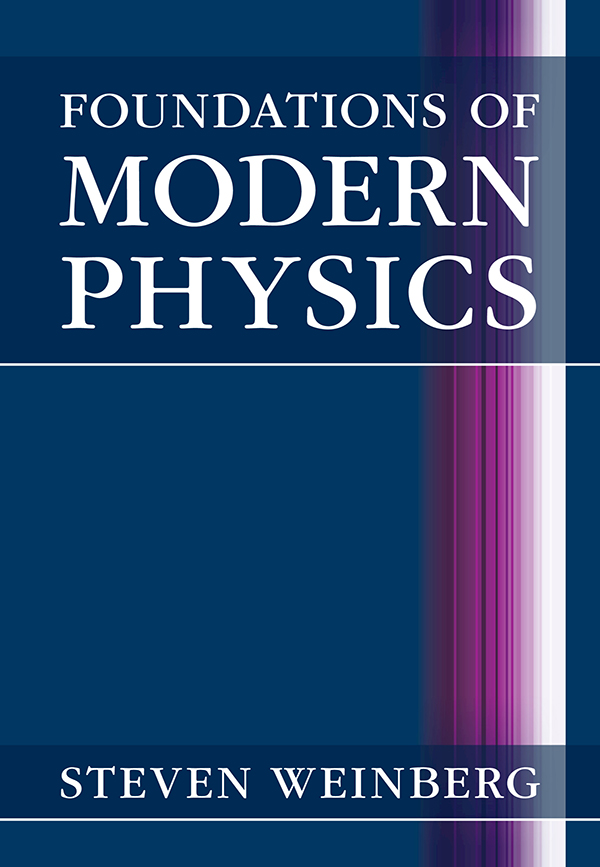
In addition to his ground-breaking research, Nobel Laureate Steven Weinberg is known for a series of highly praised texts on various aspects of physics, combining exceptional physical insight with a gift for clear exposition. Describing the foundations of modern physics in their historical context and with some new derivations, Weinberg introduces topics ranging from early applications of atomic theory through thermodynamics, statistical mechanics, transport theory, special relativity, quantum mechanics, nuclear physics, and quantum field theory. This volume provides the basis for advanced undergraduate and graduate physics courses as well as being a handy introduction to aspects of modern physics for working scientists.
STEVEN WEINBERG is a member of the Physics and Astronomy Departments at the University of Texas at Austin. He has been honored with numerous awards, including the Nobel Prize in Physics, the National Medal of Science, the Heinemann Prize in Mathematical Physics, and most recently a Special Breakthrough Prize in Fundamental Physics. He is a member of the US National Academy of Sciences, the UKs Royal Society, and other academies in the US and internationally. The American Philosophical Society awarded him the Benjamin Franklin medal, with a citation that said he is considered by many to be the preeminent theoretical physicist alive in the world today. He has written several highly regarded books, including Gravitation and Cosmology, the three-volume work The Quantum Theory of Fields, Cosmology, Lectures on Quantum Mechanics, and Lectures on Astrophysics.
Steven Weinberg
University of Texas, Austin


University Printing House, Cambridge CB2 8BS, United Kingdom
One Liberty Plaza, 20th Floor, New York, NY 10006, USA
477 Williamstown Road, Port Melbourne, VIC 3207, Australia
314321, 3rd Floor, Plot 3, Splendor Forum, Jasola District Centre, New Delhi 110025, India
79 Anson Road, #0604/06, Singapore 079906
Cambridge University Press is part of the University of Cambridge.
It furthers the Universitys mission by disseminating knowledge in the pursuit of education, learning, and research at the highest international levels of excellence.
www.cambridge.org
Information on this title: www.cambridge.org/9781108841764
DOI: 10.1017/9781108894845
Steven Weinberg 2021
This publication is in copyright. Subject to statutory exception and to the provisions of relevant collective licensing agreements, no reproduction of any part may take place without the written permission of Cambridge University Press.
First published 2021
Printed in the United Kingdom by TJ Books Limited, Padstow Cornwall
A catalogue record for this publication is available from the British Library.
Library of Congress Cataloging-in-Publication Data
Names: Weinberg, Steven, 1933 author.
Title: Foundations of modern physics / Steven Weinberg, The University of Texas at Austin.
Description: New York : Cambridge University Press, 2021. | Includes bibliographical references and indexes.
Identifiers: LCCN 2020055431 (print) | LCCN 2020055432 (ebook) | ISBN 9781108841764 (hardback) | ISBN 9781108894845 (epub)
Subjects: LCSH: Physics.
Classification: LCC QC21.3 .W345 2021 (print) | LCC QC21.3 (ebook) | DDC 530dc23
LC record available at https://lccn.loc.gov/2020055431
LC ebook record available at https://lccn.loc.gov/2020055432
ISBN 978-1-108-84176-4 Hardback
Cambridge University Press has no responsibility for the persistence or accuracy of URLs for external or third-party internet websites referred to in this publication and does not guarantee that any content on such websites is, or will remain, accurate or appropriate.
For Louise, Elizabeth, and Gabrielle
This book grew out of the notes for a course I gave for undergraduate physics students at the University of Texas. In this book I think I go farther forward than is usual in undergraduate courses, giving readers a taste of nuclear physics and quantum field theory. I also go farther back than is usual, starting with the struggle in the nineteenth century to establish the existence and properties of atoms, including the development of thermodynamics that both aided in this struggle and offered an alternative program.
I fear that some readers may want to skim through this early part and hurry on to what they regard as the good stuff, quantum mechanics and relativity. That would be a pity. In my experience physics students who aim at a career in atomic or nuclear or elementary particle physics often manage to get through their formal education without ever becoming familiar with entropy, or equipartition, or viscosity, or diffusion. That was true in my own case. This book, or a course based on it, may provide some students with their last chance to learn about these and other matters needed to understand the macroscopic world.
Readers may find this book unusual also in its strong emphasis on history. I make a point of saying a little about the welter of theoretical guesswork and ill-understood experiments out of which modern physics emerged in the twentieth century. This, it seems to me, is a help in understanding what otherwise may seem an arbitrary set of postulates for relativity and quantum mechanics. It is also a matter of personal taste. Research in physics seems to me to lose some of its excitement if we do not see it as part of a great historical progression. Some valuable historical works are listed in a bibliography, along with collections of original articles that I have found most helpful.
But this is not a work of history. Historians aim at uncovering how the scientists of the past thought about their own problems for instance, how Einstein in 1905 thought about the measurement of space and time separations in developing the special theory of relativity. For this aim of historical writing it is necessary to go deeply into personal accounts, institutional development, and false starts, and to put aside our knowledge of subsequent progress. I try to be accurate in describing the state of physics in past times, but the aim of this book in discussing the problems of the past is different: it is to make clear how physicists think about these things today.
This book is intended chiefly for physics students who are well into their time as undergraduates, and for working scientists who want a brief introduction to some area of modern physics. I have therefore not hesitated to use calculus and matrix algebra, though not in advanced versions. As required by the subject matter, the mathematical level here slopes upwards through the book. Where possible I have chosen concrete rather than abstract formulations of physical theories. For instance, in presents a revision of Fermis calculation of the rate of alpha decay.
In my experience, with some judicious pruning, the material of the book up to about the middle of can be covered in a one-term undergraduate course. But I think that to go over the whole book would take a full two-term academic year.
Font size:
Interval:
Bookmark:
Similar books «Foundations of Modern Physics»
Look at similar books to Foundations of Modern Physics. We have selected literature similar in name and meaning in the hope of providing readers with more options to find new, interesting, not yet read works.
Discussion, reviews of the book Foundations of Modern Physics and just readers' own opinions. Leave your comments, write what you think about the work, its meaning or the main characters. Specify what exactly you liked and what you didn't like, and why you think so.

